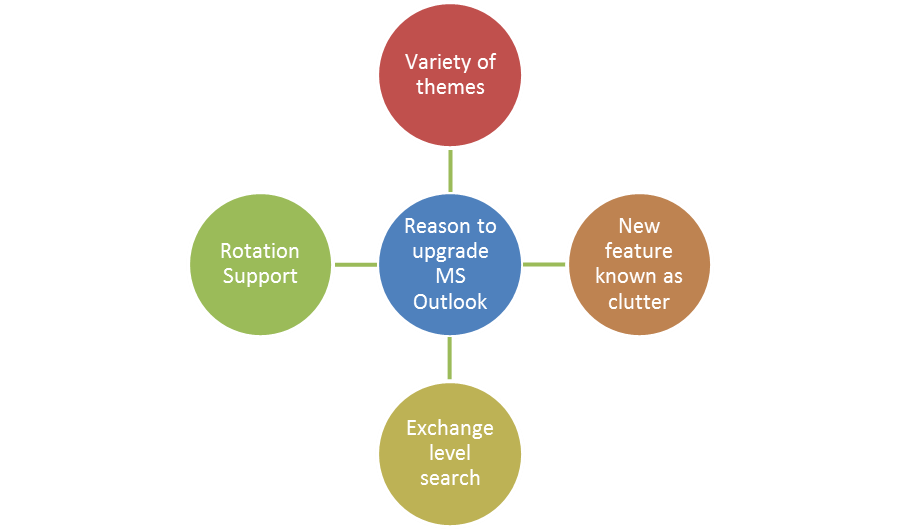
Manage contacts and make notes

Schedule your meetings

Manage different accounts on MS Outlook

Understand about Clutter which will help to manage inbox
As we know in this modern era Email has become one of the most frequently used methods of communication, whether it is used for personal, business or Professionally communications. It doesn’t matter whether you are working in a large or small organisation, email is the most preferred form of communication among the employees.
Nowadays many organisation has decided to implement corporate mail management system for, e.g., Outlook to communicate and organise meetings. It will also help to share your calendar and contacts with others.
Microsoft Outlook training is planned for delegates who have very less knowledge of the Microsoft Outlook 2016 users who want to learn the concepts covered in this course in the 2016 interface. Microsoft has added a new feature in the Outlook known as Clutter it moves emails that users ignored to Clutter to keep the Inbox clean.
Delegates will use Outlook to manage your email communications, including write, manage contact information; read, and respond to emails; schedule appointments and meetings; schedule tasks and create notes; customise message response options, and organise your mail. MS Outlook 2016 also provides different fonts for Arabic as well as Western European languages. This course will provide delegates with the knowledge and skills necessary to be a proficient user.

What is Microsoft Outlook Training?
Microsoft Outlook 2016 provides better organisation, social networking features, search capabilities, and communication. With this Microsoft Outlook 2016 training course, you will learn the four major components of Outlook including contacts, email, calendars and tasks that make things easy for users.
Why Should I take Microsoft Outlook Training?
This Outlook training is suitable for those delegates who want to upgrade their knowledge related to MS Outlook 2016, so they can compose and send, manage personal tasks, scheduling of meetings, and make notes.
Delegates will learn to customise a different set of command, manage different mail accounts, make rules to automate the variety of tasks, set different global options, attach files, check spelling. Apply filters to intercept mail and control spam, manage tasks, handle calendars and contacts, and archive data to protect it.
What are the benefits of Taking Microsoft Outlook Training?
Delegates will learn tasks such as:
Why choose Pentagon Training?
Pentagon Training is known as the best training Provider in all domains.Our instructors are certified and experienced so that delegates will not get difficulty during the course. Pentagon training is one of the most leading training providers of this training due to its high-quality content. It is most trusted by professionals and industry leading brands. Our well trained and experienced instructors teach that what is required by industry.
Enquire Now
----- OR -------
Reach us at +44 1344 961530 or info@pentagonit.co.uk for more information.
Inverness is the managerial centre for the Highland Council area and is started as the capital of the Highlands. Inverness dishonesties near two important fight places: the 11th-century battle of Blàr name Fèinne in contradiction of Norway which removed place on The Aird and the 18th-century Battle of Culloden which removed place on Culloden Moor. It is the northernmost urban in the United Kingdom and dishonesties within the Great Glen at its north-eastern edge where the River Ness arrives the Moray Firth. At the latest, a settlement was recognised by the 6th century with the first royal charter being obvious by Dabíd mac Maíl Choluim in the 12th century.
Climate:
In common with Scotland, Inverness has a sea weather. Its protected location types it one of the driest parts of Scotland. Regarding snowfall, Inverness sees about 18.3 days of dwindling snow per year, and the record buildup of snowfall was 1 foot 2 inches in January 2010. The weather here is much unkinder than south-eastern Britain. The highest fever recorded is 29.7 °C in July 2006. Characteristically the real day should rise to 25.4 °C with a total of 2 days attainment, or beyond 25.1 °C. The lowest temperature logged is -18.7 °C in January 2010. Characteristically the coldest night should fall to -10.6 °C. Climate in this area has mild changes between highs and lows, and there is passable rainfall year-round. The Köppen Climate Organization subtype for this climate is Cfb.
We are offering more than 250 courses at 91 locations in UK.